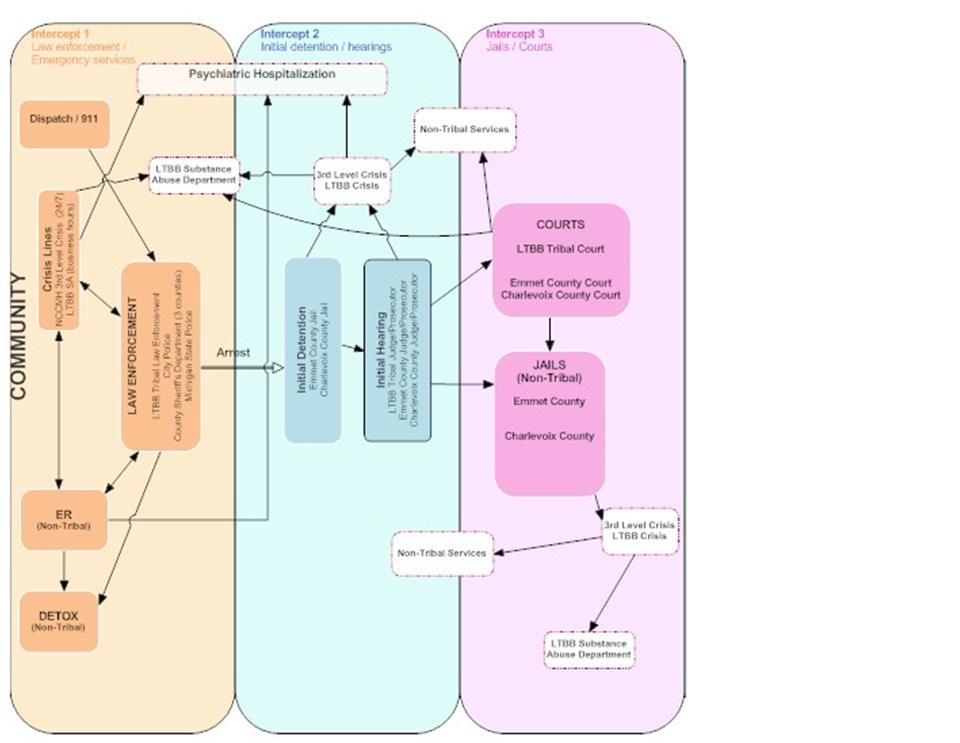As a result of the 2012 SAMHSA’s GAINS Center Sequential Intercept Mapping (SIM) solicitation, the GAINS Center conducted a unique cross-systems mapping at the Tribal community of the Little Traverse Bay Bands of Odawa Indians (LTBB)[1] in Northern Michigan. The SIM workshop brings together key stakeholders from local criminal justice and behavioral health systems in order to create a cross-systems map, and identify points of intervention and criminal justice diversion for persons in behavioral health crisis at the earliest possible point, beginning from their first point of contact in either system[2]. The Sequential Intercept Mapping is based on the Sequential Intercept Model[3] developed by Mark Munetz, M.D. and Patty Griffin, Ph.D., along with the National GAINS Center.
The LTBB Tribal community requested the SIM Workshop out of recognition that many of the Tribal members who are suffering with co-occurring substance use and mental disorders are becoming involved in criminal justice system. The workshop participants indicated that 80% – 90% of the Tribe’s dual diagnosis clients who are seeking substance abuse and/or mental health services are also involved in the justice system. It was likewise indicated by local law enforcement departments that numerous encounters with Tribal members are related to or involve members with substance use or abuse and/or mental illness. The participants in the workshops included 29 individuals representing multiple stakeholder systems including mental health, substance abuse treatment, human services, advocates, consumers, law enforcement, and the courts. GAINS Center Consultants Patricia A. Griffin, Ph.D. and Travis Parker M.S., L.I.M.H.P., C.P.C, facilitated the workshop sessions.
The LTBB SIM Workshop was the first Tribal mapping conducted by the GAINS Center, and it turned out to be a truly unique experience. Mappings in non-tribal communities typically look at the flow of the target population through a single jurisdiction; however, in Tribal communities this is more complex. Tribal members are not only involved in the traditional behavioral health and justice systems, but also the Tribal behavioral health and justice systems.
Although the LTBB Tribal community maintains its own criminal and behavioral health systems, there are other factors that complicate the cross-systems flow of Tribal members with behavioral health and justice involvement. For example, out of 4,458 Little Traverse Bay Bands of Odawa Indians Tribal citizens, only one quarter of Tribal members live on the reservation land. The area inhabited by most Tribal members spans the three Michigan counties of Emmet, Charlevoix, and Cheboygan.
Law Enforcement, Courts, and Jails
Within these counties are various layers of law enforcement, including city police, county sheriff’s departments, state police, and the LTBB Tribal Law Enforcement Department. Tribal and non-tribal law enforcement systems indicated that they have respond to calls involving LTBB Tribal members with co-occurring mental disorder and substance use disorder.
Similarly, there are both Tribal and non-tribal courts and behavioral health systems. The LTBB Tribal Court has the Waabshki-Miigwan (White Feather) Program available for eligible Tribal members with substance use disorders. The treatment portion of the program focuses on spiritual, emotional, physical, and mental wellness activities. It applies traditional elements such as the “Seven Grandfather Teachings” and the “Medicine Wheel Teachings”. Substance use and mental health services are provided by the LTBB Substance Abuse Department. Participants are linked with “Sobriety Mentors” and peer support services such as the White Bison Indian/Red Road to Wellbriety or AA 12-steps. The program also includes wrap-around recovery services such as physical health, employment, and education opportunities. (LTBB Tribal Court, 2011). [4]
The LTBB Tribal community does not have a jail, and therefore contracts jail space from two local county jails. Calls and responses involving Tribal members may involve any one of these law enforcement departments.
Behavioral Health Services
There are mental health and substance abuse services available to Tribal members by the LTBB Substance Abuse Department; however, the availability of services is limited in comparison to the need. Thus, many Tribal members are referred to non-tribal service providers. The LTBB Substance Abuse Department has a crisis-line, but crisis services are only available during normal business hours. During non-business hours, Tribal members are referred to the North Country Community Mental Health, Third Level Crisis Center Line.
Adding to the complexity of the cross-systems flow is the fact that many times Tribal members are not identified, and thus never receive referrals to Tribal entities. Of course it is ideal that Tribal members are diverted or processed in Tribal systems, so that they can receive the most culturally appropriate intervention, treatment, or services.
With these many layers of criminal justice and behavioral health, few mechanisms for collaboration and coordination often result in culturally inappropriate responses, treatment, and interventions; and, inefficient use of resources.
Crucial Priorities that were identified by the LTBB SIM Workshop participants include:
- Implementation of formal screening processes across all intercepts to identify Tribal members as early as possible
- Strategies to divert Tribal members from criminal justice system involvement at the earliest possible points
- Development of a well-organized system of collaboration among Tribal and non-tribal behavioral health and criminal justice entities
- Training to increase cultural competency and understanding across systems
As a result of the LTBB SIM Workshop, existent task forces (i.e., LTBB Justice and Mental Health Task Force[5]), staff or providers from programs and services (i.e., North Country Community Mental Health and the WAABSHKI-MIIGWAN “White Feather” Drug Court Program), and community leaders and stakeholders were able to address the issues as a group, identify gaps, and develop strategies and partnerships to address gaps and enhance existing resources.
Citations
[1] Little Traverse Bay Bands of Odawa Indians (Government Center) http://www.ltbbodawa-nsn.gov/index.html
[2] Policy Research Associates, Inc. (2012). Sequential Intercept Mapping [Brochure]. Delmar, NY.
[3] Munetz, M. & Griffin, P. (2006). A systemic approach to the de-criminalization of people with serious mental illness: The Sequential Intercept Model. Psychiatric Services, 57, 544-549.
[4] Waabshki-Miigwan (White Feather) Program https://www.ltbbodawa-nsn.gov/tribal%20court/DrugCourt/DCIndex.html
[5] LTBB, Justice and Mental Health Task Force. (2011). Little Traverse Bay Bands of Odawa Indians: Collaboration of Justice and Mental Health Systems – Planning Project.


